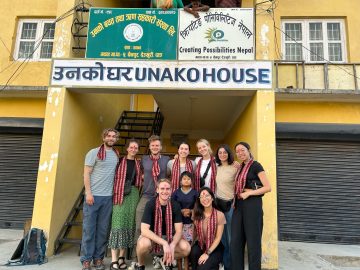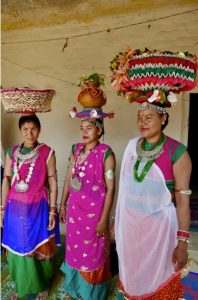
NOTE: THE NEPAL SICKLE CELL DISEASE PROJECT & NEPAL SEXUAL AND REPRODUCTIVE HEALTH PROJECT HAVE BEEN COMBINED TO FORM THE NEPAL HEALTH EDUCATION PARTNERSHIP PROJECT THIS YEAR (2024-2025)
Location: Dang District, Nepal
Date & Duration of Project: planning and fieldwork TBA
Number of Positions: 4 new hires yearly, a team of 8 in total
Commitment: 2 years min
Project Website: www.ubcsicklecell.wordpress.com
OVERVIEW
The Nepal Sickle Cell Project is a global health initiative that prioritizes public health, advocacy, and health education in rural Nepali communities. Collaborating closely with the Nepal Sexual and Reproductive Health Initiative, it operates within the larger framework of the UBC Nepal Health Education Partnership.
The UBC Nepal Health Education Partnership took root during the summer of 2015 when 12 UBC medical students journeyed to the rural province of Dang in Nepal. They partnered with non-profit organizations Creating Possibilities (CP) Nepal and Her International and engaged with local Nepali health professionals. Together, they formulated a plan to screen for Sickle-Cell Disease (SCD) specifically among the indigenous Tharu population, who have a higher SCD prevalence compared to the general Nepali population.
Over the years, the UBC Nepal Health Education Partnership has provided consistent support for the SCD Education and Screening Program and, more recently, the Pain Education and Management Program in Dang. The team continues to make annual visits to Dang, focusing on community education and advocacy for SCD, conducting mass screenings, health assessments, and resource development.
SCD EDUCATION & SCREENING PROGRAM
SCD is an inherited hemoglobinopathy marked by misshapen “sickle” red blood cells that can obstruct small blood vessels, leading to impaired blood flow. This condition results in multi-organ damage, severe pain crises, a heightened risk of infection, and, if not properly managed, potential fatality
In the project’s inaugural year, the initial UBC team conducted a mass-screening program, subsequently publishing data that estimated the sickle cell trait’s prevalence to be 9.3% among the Tharu population in Dang. Subsequently, the Nepal Sickle Cell project has pursued three key objectives: the creation of educational resources for SCD, fundraising to sustain annual SCD screening programs, and advancements in care management for individuals with SCD.
The long-term aspirations of the Nepal Sickle Cell Disease project encompass establishing an evidence-based foundation for policy changes and securing governmental support. Ensuring sustainability remains a foremost priority of the UBC SCD Nepal project.
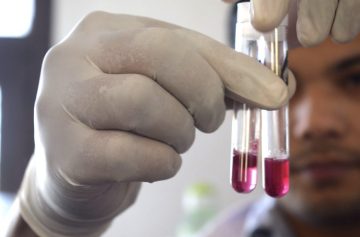
Project Objectives:
- Characterize the prevalence of SCD among the Tharu population in the Dang region.
- Educate community members and raise awareness about SCD.
- Identify and address barriers to accessing SCD healthcare in rural Dang.
- Advocate for health and infrastructure improvements.
- Expand the SCD screening and diagnostic program by providing resources and training needed for testing.
- Lobby the government to expand the project to a universal newborn.
Every year, the UBC team travels to Dang to help with the annual mass education and screening program for SCD. During this time, the team:
- Improves SCD community education material. In recent years, the primary focus of the project has been to increase awareness and understanding of SCD among the Tharu community through the development and delivery of educational materials. Despite the fact that some government support is available for individuals officially diagnosed with SCD in Nepal, a multitude of barriers prevents many individuals from accessing treatment, or from even being diagnosed to begin with. One of the most significant of these barriers to care is the level of health literacy among the local population, particularly around Sickle Cell Disease. The UBC Sickle Cell Project has attempted to address gaps in SCD literacy through the development of culturally sensitive educational modules about Sickle Cell Disease. These modules explain the cause, symptoms, and inheritance pattern of SCD at a level appropriate for the local population and encourage all individuals to get screened, outlining the entire process of screening, diagnosis, and access to treatment.
-
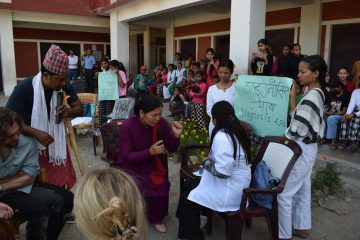
Assists in community SCD education events. This includes collaborating with CP Nepal staff to host “forum theatres”–educational plays in public community spaces – where up to 200 locals gather to watch the story of a family who goes through the process of screening, diagnosis and treatment for SCD. Additionally, the team assists in SCD training sessions for local female community health workers who play a pivotal role in community education.
- Participates in the annual SCD screening day. The team supports organization and community engagement at the local health outpost where the SCD screening tests are being conducted. In 2023, 242 individuals were screened for SCD using a solubility test, increasing the total number of individuals screened since project initiation to 5289.
- Meets with local physicians and stakeholders. The team visits local health outposts and hospitals to meet with experts and leaders. This was to gain a better understanding of SCD and other healthcare needs in the region and engage relevant stakeholders in informing the future project direction. A priority that was identified in 2022 was the purchase of a gel electrophoresis machine to increase diagnostic capacity of SCD in the region.
PAIN EDUCATION & MANAGEMENT PROGRAM
During previous years’ community engagement activities related to SCD, critical gaps in pain education and management were identified by CP, particularly pertaining to medication literacy and access to healthcare. Given that acute and severe pain crises are characteristic of SCD, the team wanted to further explore these gaps. In collaboration with CP, the team conducted a needs assessment to identify patient needs in education and management for pain in rural Dang, with the goal of creating educational resources to address identified gaps.
Community input was gathered through a 16-question Pain Experience and Knowledge survey. The survey included five sections: participant demographics, experience of pain, personal pain management strategies, barriers to care, and educational needs. While in Dang in May 2023, the team informally trialled the questionnaire with community members to identify areas of improvement and train CP staff for data collection. Afterwards, CP staff delivered the questionnaires during community events for formal data collection. To date, 82.92% of respondents reported experiencing pain. The Average pain severity was rated at 3.47 for acute and 3.81 for chronic pain on a 0-10 scale. A majority experienced daily or weekly pain and participants travelled an average of 1.10 hours for medical care. Participants primarily relied on traditional/herbal remedies or rest and relaxation for pain management. Common access barriers included limited nearby care or providers, lack of knowledge, and medication costs. Concerns about medication addiction or tolerance and side effects deterred pain care-seeking. Topics desired for pain education included causes of pain, how to take medication, side effects, and non-pharmacological pain management strategies.
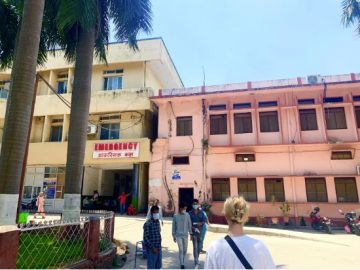 Healthcare workers, including physicians and community health workers, provided input via semi-structured interviews. Interview topics included common reasons for seeking pain management, current treatment methods, and care delivery challenges. Preliminary thematic analysis revealed barriers such as low pharmaceutical literacy, strict government regulations on pain medications, and pharmaceutical scarcity in rural regions. Proposed solutions included creating community educational resources and expanding community health worker training.
Healthcare workers, including physicians and community health workers, provided input via semi-structured interviews. Interview topics included common reasons for seeking pain management, current treatment methods, and care delivery challenges. Preliminary thematic analysis revealed barriers such as low pharmaceutical literacy, strict government regulations on pain medications, and pharmaceutical scarcity in rural regions. Proposed solutions included creating community educational resources and expanding community health worker training.
Community and healthcare worker input highlights a high prevalence of pain in Dang, coupled with inadequate knowledge and resources to meet population care needs. Collaboration with community partners is crucial for developing pain education and management resources in this region, which is the next step in this project once the needs assessment is completed.
FUNDRAISING
Annually, the UBC teams secures funds (via fundraising campaigns, grants, and sponsorships) to sustain mass SCD screenings at community health posts in Dang, along with other health education initiatives. The funds collected for the project are allocated to procure screening equipment and supplies for local health posts, provide training and support for lab technicians and health workers, and cover the expenses for screening and transportation (to and from health centers) for local community members.
RESEARCH
The UBC Nepal Health Education Partnership’s main objective is to create and implement educational programs that enhance health outcomes in Dang. To accomplish this, the partnership has conducted various health needs assessments in collaboration with CP Nepal, continuously gathering program data for quality improvement. To disseminate the results of screening programs and needs assessments, the team actively participates in knowledge translation. In recent years, they have showcased their findings through poster and oral presentations at multiple conferences across North America. Furthermore, the team’s efforts have resulted in several published works:
Marchand, M., Gill, C., Malhotra, A. K., Bell, C., Busto, E., McKeown, M. D., Cherukupalli, A., Yeo, J., Arnold, B., & Kapoor, V. (2017). The assessment and sustainable management of sickle cell disease in the indigenous Tharu population of Nepal. Hemoglobin, 41(4–6), 278–282. https://doi.org/10.1080/03630269.2017.1414058
Liu, A. Q., Benson, N., Liang, K. E., Rosenkrantz, M., Malhotra, A. K., Marchand, M., Cherukupalli, A., Taylor, J., Starkey, S. Y., Lee, S., Jay, M., & Kapoor, V. (2023). Exploring barriers to sickle cell disease care in a lower-middle income country – a qualitative exploration of the Tharu perspective in rural Nepal. Clinical Epidemiology and Global Health, 22, 101337. https://doi.org/10.1016/j.cegh.2023.101337
The team is currently working on two manuscripts, targeting publication in 2023/2024:
- Enhancing Pain Management and Education in Dang, Nepal: Insights from a Community and Healthcare Worker Needs Assessment
- Education and Screening for Sickle Cell Disease in Rural Nepal: A 9-Year Review
